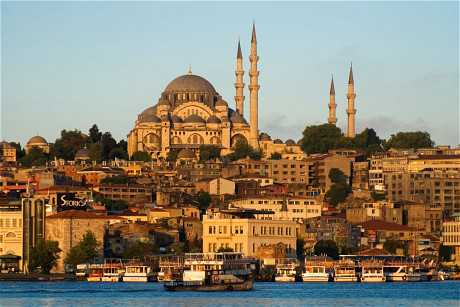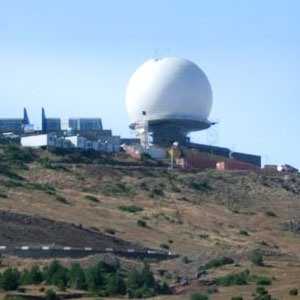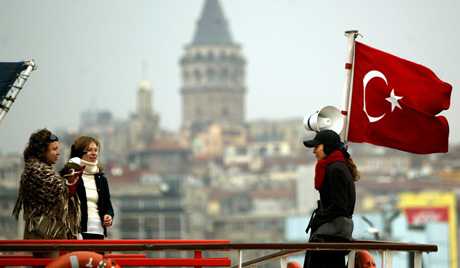by Joshua Kucera
Turkey’s decision in 2011 to host a radar for NATO’s missile defense system has been widely interpreted as a reaffirmation of Turkey’s commitment to NATO, and more generally to a western geopolitical orientation, at a time when a number of analysts and policymakers have worried that Turkey is “drifting eastward.” As analyst Ömer Taşpınar put it last year, “That decision, in my opinion, was almost a make-or-break move for the Obama administration in terms of testing Turkey’s commitment to NATO, testing Turkey’s commitment to the trans-Atlantic partnership.” More recently, on the occasion of U.S. Secretary of State John Kerry’s visit to Ankara, as EurasiaNet’s Yigal Schleiffer pointed out, Turkish commentators again noted the significance of the decision to host the radar:
In Washington, Turkey’s realignment with the U.S. particularly after the employment of the missile radar system and Ankara’s decision to side with the Syrian opposition despite Iranian and Russian objections appeared as good news.
But that may not be a correct interpretation of Ankara’s decisionmaking, notes Aaron Stein, an Istanbul-based researcher at the Center for Economics and Foreign Policy Studies who studies Turkish defense issues. Turkey’s reluctance to host the radars originally — and then its decision, ultimately, to accept them — both had more to do with Turkey’s calculations of its own security rather than about geopolitics, he said in a brief email interview with The Bug Pit.
The Bug Pit: Turkey’s decision to host the radars has been described as a “make or break decision” from the White House’s perspective, on testing Turkey’s commitment to NATO and a geopolitical orientation to the West. Was that an accurate reading of Ankara’s decision? How much of the decision was based on a desire to reaffirm its commitment to NATO and the US?
Aaron Stein: Turkey, unfortunately, has a very difficult time articulating its foreign policy strategy to western audiences. For some reason, Ankara has yet to fully grasp the two page bullet point memo culture that permeates Washington. Ankara still likes to talk in long winded platitude, which, in my opinion, often leads to misunderstandings. Thus, it often runs into trouble when it takes positions that, on the surface, appear at odds with its western allies. The negotiations for the deployment of the radar took place during Turkey’s attempt to broker a solution to the Iranian nuclear issue. The pre-Syria AKP believed that the best way to engage with Iran was to diplomatically engage with the regime’s leadership, in order to appeal to the moderates and isolate the hardliners. Ankara believed that threatening language and sanctions undermined the Iranian pragmatists and strengthened the hardliners. In turn, a coercive approach would raise the likelihood of a military strike, which would severely hurt Turkey’s economic and security interests.
Thus, during the negotiations for NATO’s 2010 Strategic Concept, Ankara objected to the inclusion of Iran and Syria as specific threats to the Alliance. Ankara, therefore, was not objecting to the concept of missile defense – far from it actually. Instead, the regime was keen on painting the NATO missile shield as a defensive measure, designed solely to protect members from the threat of ballistic missiles in the abstract. Therefore, Ankara’s objections were to the proposed wording in the Strategic Concept and not to the proposed missile shield.
During the first Gulf War, Ankara lacked the tools to protects its territory from Iraqi ballistic missile attack. Ankara, therefore, asked the NATO alliance to provide it with Patriots. However, the deployment was delayed, due to internal NATO disputes about sending the missiles to Turkey. Turkey, therefore, was rightly upset about what they perceived to be as NATO’s dithering on the deployment of a system that its saw as critical for the defense of Turkish territory. However, Ankara’s anger also shows just how seriously Ankara believes in the concept of missile defense. Through out the 1990s, Turkey consistently identified the dual threat of ballistic missiles and weapons of mass destruction in the Middle East as one of its top security threats. Thus, in the late 1990s, the Turkish military began to negotiate with Israel for the sale of the Arrow missile system. The negotiations, however, were halted after the 2001 financial crisis.
Turkey, therefore, was a big supporter of the US plan to deploy a NATO missile shield. Turkey, along with the other NATO allies, supported the U.S. backed proposal to deploy a European missile shield in 2008. However, in 2010, it was not prepared to accept the French backed proposal to identify Iran and Syria as specific threats to the Alliance. Moreover, Ankara also sought to wrangle guarantees from the Alliance so that the system would be capable of covering all of Turkish territory. In addition, the Turkish military wanted to have some operational control of the missile system, in order to ensure that it would be used to protect Turkish territory, should Iran or Syria launch a surprise missile attack. Again, the issue was not the radar, but the NATO security guarantee. This approach, once again, shows that Turkey is supportive of ballistic missile defense as concept. However, they are keen on ensuring that they receive the appropriate guarantees to ensure that they will be protected by the Alliance.
TBP: What are the most significant benefits, from Ankara’s perspective, from allowing the radars to be placed there? How did they weigh the defensive and geostrategic elements of this issue?
AS: The most significant benefit is the deployment of a ballistic missile system ostensibly aimed at protecting Turkish citizens from the threat of ballistic missile attack. The radar augments Turkish air defenses, particularly against the threats that Turkey is most vulnerable. However, scant attention is paid in Turkey to limits of the system and the problems with the SM-3 interceptor. As I explained, Turkey is for missile defense as a concept. However, their criticisms are political, rather than based on a sober assessment of the effectiveness of missile defense as a concept. In any case, Turkey hopes to augment the proposed NATO missile system with its own missile defense system. Originally, Ankara had sought to purchase a system – albeit with substantial offsets – from a foreign supplier. However, recently, Ankara has dropped its previous approach, in favor of a co-production deal with one of the proposed suppliers.
That latter missile defense system that Stein referred to also has been heavily scrutinized as ageopolitical bellwether, given that Turkey was choosing between American, European, Russian, and Chinese systems. In a recent post on his blog, Turkey Wonk, Stein wrote:
While never stated outright, Turkey appears to have wanted to purchase the Patriot, but was determined to have access to the design information. Raytheon and Lockheed refused, which prompted Turkey to kick the can down the road.
This decision sheds light on how the Turkish leadership views its current security status. Turkey has opted to turn to NATO for its defense from ballistic missile attack… It also indicates that Ankara is committed to using foreign supplied technologies to jump-start its own domestic defense industry. These two approaches, indirectly, reveal that NATO remains the centerpiece of Turkey’s defense planning. However, Turkey’s growing assertiveness and desire to have a more flexible foreign policy is evident in the way it has pursued the missile defense tender.
Last month, Turkey announced that it would no longer be looking for an off-the-shelf missile defense system, but will try to contract with a foreign company to jointly develop its own system. Stein writes that the likely winner of that bid will be the European consortium:
I still believe that Eurosam’s AMP/T Aster 30 has the best chance of winning the tender because the consortium has indicated that it is willing to transfer the system’s technology to Turkey. The Russian and Chinese missile systems are not compatible with NATO radar and the proposed Alliance missile shield, which is likely to preclude them from being chosen. Finally, U.S. companies have traditionally balked at Turkey’s aggressive tech transfer demands. For example, U.S. firms lost the bid to upgrade Turkey’s F-4 aircraft and the M-60 tank because they were not as willing as the Israelis to share the technology with Turkey. Moreover, Ankara has a history of engaging European firms for the co-production of big-ticket military systems. Agusta-Westland beat out the U.S. based Sikorsky for Turkey’s attack helicopter tender because the European firm offered to co-produce the system and even allows for Turkey to export the helicopter. The U.S. company was not willing to offer such generous terms. While I do no expect the decision to happen any time soon, I do believe that the European company has the best shot at winning the new tender.
It’s often the case that what might seem from a distance to be a geopolitical move may be in fact driven by more local concerns. And that may be what’s going on here.






